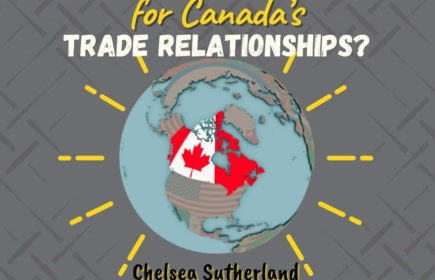Insights from Canada's Chief Agriculture Negotiator and Director General
On December 10, 2024, Claire Williams and I had the privilege of being part of the Saskatchewan Forage Seed Development Commission’s AGM and Forage Seed Production Forum day in Arborfield, Saskatchewan. The day was filled with great presentations, with a focus on regenerative agriculture practices, and interesting conversations with farmers from Northeastern Saskatchewan. One of the highlights of the day (aside from the delicious lunch taco bar!) was a talk from Matthew Smith, Canada’s Chief Agriculture Negotiator and Director General on market perspectives. The talk was pre-recorded in Ottawa and shown as a video on the big screen. A live, virtual Q&A period following the video allowed those in attendance to ask questions and voice their concerns regarding the future of Canada’s key trade relationships. In this blog, I’ll discuss Mr. Smith’s insights as well as the concerns of those directly impacted by Canada’s agricultural trade negotiations: the farmers.
Preparing for All Possibilities
In his talk, Mr. Smith highlighted that with the incoming Donald Trump administration in the United States (US) following the November election, the future of North American trade relationships is somewhat uncertain. During Trump’s last presidency, the existing North American Free Trade Agreement (NAFTA), which allowed free trade to exist between these three countries, was replaced with the Canada United States Mexico Agreement (CUSMA), a similar but updated version of the agreement which is set to be reviewed in 2026. Now, as Trump enters another term in office, he has threatened to place up to 25% tariffs on all imports from Mexico and Canada, a step up from the tariffs he imposed on Canadian aluminum and steel in 2018.
As a major exporting country, the Canadian economy stands to be significantly impacted by tariffs enacted by our number one trade partner. The Canadian and US agricultural industries are particularly integrated, with over 50% of Canadian ag exports and imports being purchased and supplied by the US, including grain, beef, and pork. If tariffs are put in place on Canadian agricultural exports, we may need to shift the focus of our exports elsewhere. However, in the wake of a long-standing trade relationship, shifting over half of our exports to a different market is easier said than done. Yet, some are speculating that the threat of tariffs is simply a negotiation tactic and will never actually come to pass since they stand to harm the American economy as well. In his presentation, Mr. Smith indicated that their team is preparing for many different possible scenarios that they could face at the negotiation table.
Voice Your Concerns
Farmers in the audience at Arborfield were concerned about Canadian agriculture’s competitiveness if new trade restrictions were to exist. Questions arose about whether or not Canadian negotiators “give-and-take” when it comes to trade agreements specific to different sectors, such as oil and gas, agriculture, and aluminum. In other words, do negotiators worsen trade conditions in some sectors in order to gain ground in another? Other audience members questioned whether Canada would consider retaliatory tariffs if the proposed tariffs are put in place. Mr. Smith was not able to provide much detail regarding his team’s contingency planning and trade negotiation strategies. However, he did indicate that when it comes to the trade negotiations, their main goal is to keep trade flowing as freely as possible across as many sectors as possible.
Mr. Smith reiterated that during this time of preparation for the review of CUSMA in 2026, it is important they hear from Canadians regarding their concerns over the how the future of trade will impact their businesses and what they would like to see in future trade agreements. From an agricultural standpoint, he said they want to hear from farmers across all regions and commodities, as the impacts of trade negotiations will impact sectors of the agricultural industry differently. He encouraged everyone to write to or email your Member of Parliament with all of your questions and concerns about the current and future state of our trade relationships.


